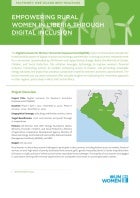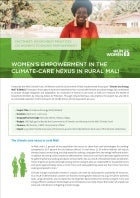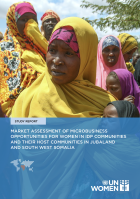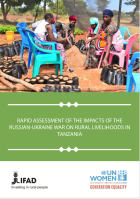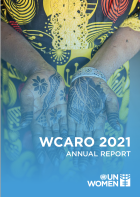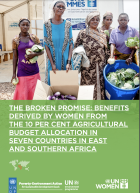1 - 18 of 18 Results
Date:
In 2022, MGCSW and UN Women South Sudan developed the Country Gender Equality Profile, highlighting progress and challenges in gender equality, women’s rights, and governance. The study calls for increased funding, legal reforms, and socio-economic initiatives to address issues like illiteracy, violence, and limited access to services. Collaborative action by the government, UN agencies, and civic groups is essential for promoting gender equality and safeguarding women’s rights. Key recommendations include allocating funding for violence survivors, establishing the Women Enterprise Fund, reviewing the Girl Child Act, and expediting gender-related laws. The government should lift social media bans, provide platforms for women’s voices, and promote women’s inclusion in constitution drafting. Efforts should also focus on disseminating the Maputo Protocol and defining the minimum marriage age to safeguard gender equality and women’s rights.
Date:
This publication is part of the WEE WCARO Best Practices series. The Digital Inclusion for Women’s Economic Empowerment (D4WEE) project in Liberia demonstrates the transformative power of digital inclusion and strategic partnerships in driving economic empowerment for rural women. Rural women face challenges to participate in the economy, including limited access to markets, financial services, or land. By connecting women to markets, enhancing access to finance, and promoting renewable energy solutions, the project leverages technology to improve women’s financial inclusion.
Date:
This publication is part of the WEE WCARO Best Practices series. The ‘‘Climate and Energy Mali” (CEMALI) project trained women in the production of improved cookstoves and sustainable fuels, reforestation activities, forestry management, and improved and efficient carbonization techniques. The project has contributed to climate change mitigation and adaptation, a reduction of women’s unpaid care work, and improved health of household members. This factsheets outlines the project's approach and results.
Date:
This analysis aims to gain insights into the unique challenges, needs, and priorities of women, girls, men, and boys. It seeks to guide humanitarian, development, and peace actors in tailoring their responses to effectively meet the diverse needs of returnees, refugees, displaced populations, and host communities.
Date:
This analysis aimed to assess the impact of the conflict in the Greater Pibor Administrative Area (GPAA), including key protection risks and needs, and to identify triggers of the conflict.
Date:
The ultimate goal is that women and girls in Sudan benefit from gender-responsive humanitarian action and targeted assistance that responds to their basic needs, and from opportunities for their meaningful participation in peace, political and humanitarian processes.
Date:
This brief emerges from Regional Gender Assessment of the Impact of Sudan Conflict on Women and Girls in Sudan and its Neighboring Countries. It provides the findings and recommendations of the regional gender analysis of the Sudan conflict, which UN Women conducted between July and August 2023.
Date:
The publication aims to understand the current landscape of microbusiness in terms of the opportunities, barriers and challenges that women in displacement settings face in accessing economic opportunities in the cities of Kismayo, Dollow and Baidoa
Date:
Women’s unpaid care responsibilities are one of the main barriers preventing women from fully profiting from new jobs created in the green economy and is limiting their contribution to climate change mitigation and adaptation. Therefore, this brief calls for action on adopting appropriate public policies to ensure that women get an equitable share of green jobs; balancing men’s and women’s responsibilities for care; supporting private sector development in the care sector to scale-up promising solutions and increasing access to time-saving and energy-efficient infrastructure.
Date:
The Russia-Ukraine war has continued to cause major disruptions in global supply value chains. This has translated into increased commodity prices and cost of living, with disproportionate adverse impacts on the wellbeing of women and girls worldwide. This rapid assessment provides an analysis of the impacts of the Russia-Ukraine crisis on rural livelihoods in Tanzania with a focus on various vulnerable groups, particularly women and girls.
Date:
This policy brief highlights the main findings of four academic research papers on the Women, Peace and Security (WPS) agenda that were presented during a workshop organized by UN Women Ethiopia Country Office in December 2021.
The findings focus on protection of women from conflict-related sexual violence; gender-sensitive recovery programs; role of women human rights defenderds in supporting the WPS agenda; and awareness of Members of Parliament on the agenda.
Date:
2021 marked the end of the latest UN Women Strategic Plan, and during the year UN Women’s West and Central Africa Regional Office (WCARO) and Country Offices/Non-Resident Agencies continued to strengthen a comprehensive set of global norms, policies, and standards on gender equality and the empowerment of women; help end all forms of violence against women and girls; foster women’s economic empowerment; encourage and support women to lead; facilitate gender mainstreaming; and support women’s participation in peacebuilding and resilience efforts. Throughout the year, the COVID-19 pandemic continued to impact West and Central Africa, and women in the region were particularly vulnerable to the crisis.
Date:
This report highlights UN Women Nigeria’s work for the year 2020. The report builds around the Nigeria Country Office programmatic areas of intervention and reflects the achievements attained in collaboration with various government and non-governmental partners who contributed to policy advocacy efforts, delivery of services, implementation, and funding of interventions aimed at promoting gender equality and women’s empowerment. The population at large (men, women, boys...
Date:
The publication aims to serve as an advocacy report on gender issues and contributing to efforts in strengthening regional norms and policies on women and youth’s economic empowerment.
Date:
The UN Women Tanzania study involved desk review, key informant interviews with the government and CSOs, an analysis of the literature of relevant laws and policies on customary practices as well as a review of land governance and land administration practices in Tanzania was done in August 2017. The study also highlights recommendations to advance women's land rights and tenure security in the context of SDGs.
Date:
The African Continental Free Trade Area (AfCFTA) an opportunity for growth and prosperity in Africa. However, because of pre-existing inequalities in African economies, the agreement’s benefits will not be distributed equally along gender lines. As the AfCFTA Secretariat is starting to draft a Women in Trade Protocol, it is important that women across the continent participate actively in the process to voice their views, interests, and needs. This advocacy brief highlights 9 important...
Date:
This report explores some key indicators of women’s economic empowerment in labour markets and women’s political participation and economic leadership in the Indian Ocean Rim region through three dimensions: resources, agency, and achievements. It highlights good practices, case studies, and challenges and opportunities for investments and initiatives, and provides key recommendations for Indian Ocean Rim Association (IORA) Member States and other stakeholders to realize women’s economic empowerment in the region.
Date:
In this issue : -Introduction: the gender gap in agricultural productivity -Three takeaways on the gender gap in agricultural productivity -Measuring the cost of the gender gap in agricultural productivity -Costing the factors that contribute to the gender gap in agricultural productivity -Finding the biggest bang for the buck: cost-effective policy interventions -Moving from recommendations to implementation -Appendix A: Methodology for quantifying the cost of the gender gap in...


